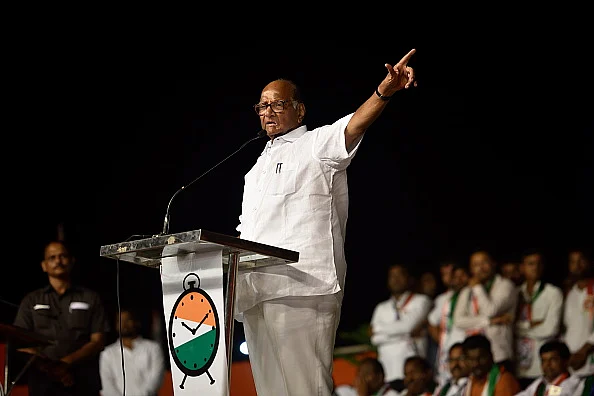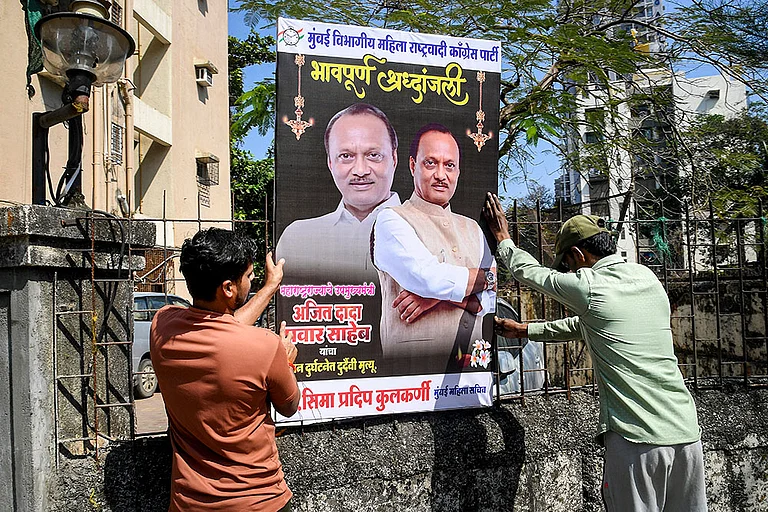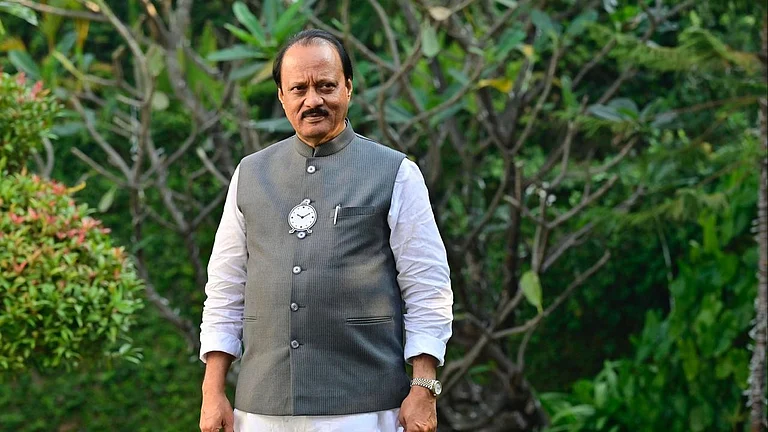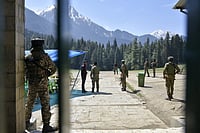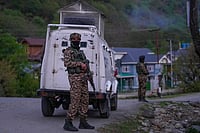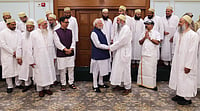In October 2019, Sharad Pawar was on a campaign trail in Satara district in Western Maharashtra, a stronghold of the Maratha community and a former capital of the Maratha kingdom, where a large crowd had turned up for his rally. The founder of the Nationalist Congress Party was campaigning for the by-election Lok Sabha polls in Satara after three-time incumbent parliamentarian Udayanraje Bhonsle quit the party and joined the rival Bharatiya Janata Party.
The bypoll had become a matter of prestige, after Bhosale, the 13th descendant of Chhatrapati Shivaji Maharaj, deserted the NCP at the last minute. Pawar personally hit the ground, meeting voters and campaigning to support NCP’s candidate Shrinivas Patil. Marathas are composed of a group of 96 clans, comprising of peasant, blacksmith, carpenter, shepherd, Bhandari, and Koli castes among others. The community account for 28 per cent of the state population and are believed to have a sway over 17-18 Lok Sabha constituencies.
That evening, the Octogenarian was addressing a crowded gathering when a sudden gust of an unseasonal rain shower drenched him mid-way through his speech. Undeterred, Pawar stood firm, the rain drenching his white shirt, and continued his talk. Like his audience who sat in the rain to hear him, he refused to take an umbrella while speaking to them.
“Varun Raja (rain gods) has blessed the NCP. With his blessings, Satara district will now do magic in the upcoming polls,” he said as the crowd cheered and clapped for him. A video of his speech, surrounded by party workers, standing tall in the heavy rainfall, went viral in Maharashtra on the news channels and social media. The image of the veteran leader, soaked in rain, generated unusual sympathy and struck a chord with the people. And just like that, the winds of political fortunes began to change.
Three days later, voters appeared in large draws at the polling stations, registering a 65 per cent turnout. In an embarrassing defeat, Bhosale lost the bypoll to NCP’s Patil by a massive 87,717 votes. The NCP repeated the winning streak in the subsequent Maharastra assembly polls and despite several defections, won 54 seats,13 more than its 2014 performance.
Political observers believe it was the rainy day speech that saved Pawar from drowning.
At 83, Pawar is once again facing a new challenge in his political career spanning over six decades, but from an insider of his own family. Last year, his nephew Ajit Pawar, broke away from the NCP and joined hands with the ruling alliance of BJP and Eknath Shinde-led Shiv Sena.
Ajit, who long harboured ambitions to rule Maharashtra as its chief minister, settled for the post of second deputy chief minister alongside Devendra Fadnavis. The one chief minister and two deputy chief ministers led BJP-Shinde Sena-NCP Ajit Pawar, government was a political mockery.
Earlier in 2019, Ajit was sworn in as the Deputy Chief Minister of Maharashtra alongside CM Devendra Fadnavis after he joined hands with the BJP, with his uncle Pawar’s blessings. The government collapsed in less than 5 days and Fadnavis and Ajit Pawar’s names entered the record books as the shortest-serving rulers. He returned to the NCP and took over as deputy CM for the Maha Vikas Aghadi government.
Ajit’s latest rebellion, was a jolt to Sharad Pawar, as he took along more than 40 NCP MLAs and claimed to be the ‘real’ chief of the NCP, which is reminiscent of his own uncle’s U-turn in 1978.
”I took a stand at the age of 60 but some people did it at the age of 38. They put Vasantdada Patil in the grey,” Ajit said at a rally in Baramati in December, in a veiled attack on his uncle.
Sharad Pawar broke away from Congress in 1978 and in alliance with the Janata Party and Peasants and Workers Party, formed the Progressive Democratic Front. He toppled Vasant Dada Patil-led Congress government and became the youngest Chief Minister of Maharashtra at 38 years.
Ajit’s NCP faction has been recognised by the Election Commission as the ‘real’ NCP, allotting him to use the party's name and symbol. He is now in the process of seizing Baramti, Pawar’s home turf. He has fielded his wife Sunetra to contest the upcoming Loksabha elections against his cousin sister, and Pawar’s daughter three-time parliamentarian Supriya Sule.
The uncle-nephew pair is recognised as towering figures in Maharashtra politics. The Pawar family has been instrumental in setting up cooperative sugar mills in Baramati and has derived its influence from the cooperative sector. In 1958, Sharad Pawar joined the Congress youth wing and by the early-to-mid 1960s, became a prominent leader of the Maharashtra unit of Congress. At the age of 27, he was nominated as a contestant for the Baramati Assembly constituency and represented the seat from 1967 to 1990. His stint as a CM was shortlived and he rejoined Congress in 1986.
Tensions between Pawar and Congress started brewing after Rajiv Gandhi’s assassination in 1991. Sensing a leadership vacuum in the party, he threw his hat in the ring and openly expressed his prime ministerial aspirations. Considering his rise in the party and an overwhelming electoral success in Maharashtra under his leadership, he felt that he had a legitimate claim to the top post. However, the party chose veteran Congressman PV Narasimha Rao. Rajiv’s young widow Sonia Gandhi, flooded with sympathy from party workers, had become an unapparent heir to the Gandhi family and the Congress party.
In 1999, Pawar was diagnosed with oral cancer. But his ailing health was not going to curb his political aspirations. A restless Pawar, who sensed his PM aspirations to be diminishing, once again raised a revolt. Along with P. A. Sangma, and Tariq Anwar opposed Italy-born Sonia’s nomination for the PM’s post. The trio alleged it was shameful that a historical party like Congress could not find an Indian person as a candidate for the post of PM.
The three Congressmen were expelled and on June 10, 1999, they formed the Nationalist Congress Party. The Indian Congress (Socialist) – Sarat Chandra Sinha party also merged into the new party.
Despite his unceremonious exit, NCP had no hesitancy to ally with the Congress-led United Progressive Alliance (UPA) to form the government of Maharashtra in 1999. The UPA stayed in power until 2014 when the Fadnavis-led NDA government came to power. The party also joined the UPA government at the Centre in 2004 and Pawar became Union agriculture minister and took over the role as the president of the Board of Control for Cricket India. Pawar faced charges of corruption in the agriculture and cricketing field, but he continued to reign supreme. He strengthened his grip in Maharashtra, by empowering the feudal families controlling the agricultural markets and sugar co-operatives and allotting them power.
In May 2014, when UPA lost to BJP-led National Democratic Alliance (NDA), NCP was out of the government for the first time in 10 years. The party was also out of power in Maharashtra, although it initially provided support to the minority BJP government.
“Pawar thrives in power. His political nature is to veer towards the winning camp for which, he can ally with any party, irrespective of the ideology,” says Sudhir Suryavanshi, journalist and author of Checkmate-How the BJP Won and Lost, who has closely followed the Pawar family for around fifteen years. “Pawar has remained relevant in politics all these years because he doesn’t draw any lines around him, in fact he blurs the lines. He is friends with everyone even opposition leaders.” Although NCP started as a national party, it has reduced to a regional player with feuding camps. “Pawar was the major face of the party. Apart from him, the NCP didn’t have much in its favour ideologically or in terms of political influence. The party succeeded in the initial years nationally and had MLAs in Kerala and Chhatisgarh but could not retain its hold,” he said.
With Pawar spending more time in Delhi, the party’s organisation in Maharashtra was left in the hands of his nephew Ajit. Pawar had groomed him as an apparent heir, as his young daughter Supriya Sule appeared reluctant to take charge. Ajit, soon gained popularity as he connected with the people in Baramati and western Maharashtra and earned political fortunes in Pune. If Pawar was known as ‘Saheb’, Ajit was referred to as the ‘Dada’ (big brother) by his supporters.
After the BJP government came to power at the centre and in Maharashtra in 2014, political observers said, Modi-Shah sensed the opportunity to weaken the Pawar family’s hold in the state. Sharad Pawar’s political power lay in the state cooperative sector. The Modi government proposed plans to move the co-operatives from a subject under the state list to the national list.
The Enforcement Directorate (ED) followed the Pawar family and conducted raids at the premises of Baramati Agro, linked to Pawar's brother Rajendra Pawar and his MLA son Rohit Pawar (grandnephew of Sharad Pawar) along with five other firms in a money laundering case connected to the Maharashtra State Cooperative Bank (MSCB). Ajit’s past deeds of corruption were also unearthed and he too came under the ED lens along with five senior NCP leaders on charges of corruption, fraudulent land deals, and money laundering cases.
The Pawar family knew it had no future being in the opposition nor could the NCP survive for long as an opposition party. Amidst intimidation, threats, and uncertainty, Pawar threw another gauntlet by extending a hand to Uddhav Thackeray from Shiv Sena. Although Thackeray was unsure of Congress chief Sonia Gandhi joining an alliance with his party, Pawar convinced her to join their alliance to keep the BJP out of power in Maharashtra. The Maha Vikas Aghadi alliance became an unexpected streak with Thackeray as the CM. But the developments threatened Ajit and the dream of ruling Maharashtra was getting distant with every election. Add to this the emergence of Supriya Sule and grandson Rohit Pawar as the next generation of the Pawar family’s leaders, which annoyed Ajit further.
When Pawar stayed in Delhi, it was Ajit who nurtured the party and established a strong grip on the party’s structure. He knows the undercurrents of the party’s politics, the strengths and the weaknesses of its leaders. If he had to secure his political future, coming out of Pawar’s shadow remained the only option. Ajit's defection has created rifts within family and his elder brother Shrinivas harshly criticised him as being ungrateful for betraying their uncle. Supriya, who was once close to Ajit, also termed his actions to join alliance with the BJP as 'painful' and has decided to stay on her father’s side.
The upcoming elections will be a tough battle for the NCP politically and within its family. Ajit’s entire career is at stake as he will have to prove that he can take forward the NCP without Sharad Pawar. He is also preparing the ground for his next heir-- wife Sunetra and son Parth. The 29-year-old son lost the 2019 Maval Loksabha seat, despite Ajit putting his political heft into getting him elected.
Whereas Sharad Pawar, the political dynast retook the party’s reign after briefly quitting as the NCP’s chief last year. He assured his supporters that he will not abandon the party and rebuild it with his own hands. As he looks to re-establish his relevance, the grand old man appears to be just getting started.






